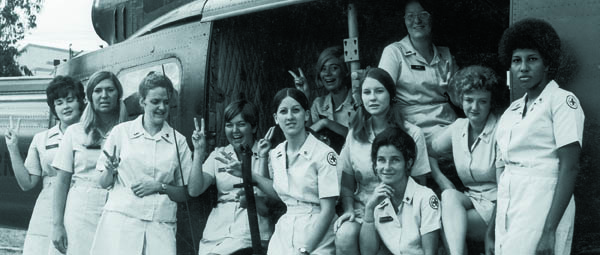“We were just out of college with a thirst for adventure and a desire to do something real” Holley Watts (1966-67)
The air popping “whop-whop” of an inbound slick was ordinarily no reason to catch infantryman Vergel Maples’ attention. Just another resupply on another day digging another hole in the boonies, until he caught a glimpse of powder blue in the doorway. The excited cries of his fellow grunts rang through the dusty air: “It’s the Donut Dollies! The Donut Dollies are here!” Maples had heard about the young Red Cross girls, but today was his first chance to see them, and it was a day he would never forget.
‘It was as if the war was
in black and white, but when the Dollies came,
it suddenly turned to color’
Billy Dabel, U.S. Army (1969–70)
The Supplemental Recreation Overseas Program started in World War II, as the American Red Cross “close military support directive” took women to bases in Europe to deliver coffee and donuts to servicemen. Revived in Vietnam, the program become an airmobile morale boost to troops at landing zones, base camps and forward operating positions.
Vietnam’s “Donut Dollies” may have inherited the WWII nickname, but their work was very different, as the women paired up in Hueys and airplanes, sometimes visiting as many as 10 locations in a day. Their mission was to take the men’s minds off the war. Through diversionary games, delivering mail or serving up hot chow, astonished combat troops suddenly found themselves looking up from the war and into the smiling face of the girl next door.
The Donut Dollies went to Da Nang with the Marines in 1965. By the time the program ended in 1972, 627 had served in all operational areas, logging 2,125,000 air miles. Their airmobile capability allowed the relatively small number of Dollies to interact with literally hundreds of thousands of combat troops. Despite the inherent dangers and the ever-present horrors that they encountered, the Red Cross girls always had a ready smile for battle-weary troops.
John F. Kennedy’s call to their innate patriotism inspired many Donut Dollies, while others wanted to break with the expected roles of women to experience the war. For some, like Joyce Rice Denke, the motivation was more personal. After her fiancée was killed in action, Denke jumped at the chance to go to Vietnam. “You didn’t know, when you saw that guy, if he’d gotten the letter that day from his girlfriend before he went out on patrol,” says Denke, “but at least you knew he’d gotten a smile from a Red Cross girl.”
As one of the Dollies walked down the line at infantryman Maples’ camp in 1967, mortars began falling around them. Maples grabbed the wide-eyed girl and threw her into his hole. “I was worried about her,” he said. “She was so clean and so sweet. But I couldn’t help but think—this might be a good way to die.” Maples has always wished he could find that girl. “I was so awestruck by her that I’m not sure I ever thanked her for coming out there, for putting her life on the line for us.”
‘Forget about the war.
Let’s take your mind off
it for a few minutes’
Joyce Rice Denke (1969–70)
The donut dollies developed the morale-boosting programs they took to the field. Elaborate, competitive trivia games engaged even reticent soldiers. “There’s nothing like a little competition to get a 19-year-old going,” recalls Emily Strange. The women also created “Short-Timer Calendars” to help the guys count down the days until they returned to The World. But often they just sat with the battle-worn troopers and talked. “You were his sister, his girlfriend, his mother, his friend,” says Barbara Dorr Lilly. “Our job was to make him forget that tomorrow might not come for him.”
Helicopter pilot Bob Lunde loved it when his crew drew Donut Dolly duty. “We always took the long way home,” Lunde says, remembering the laughter—and perfume—that would suffuse his Huey. “It was a lot better than the smells we usually had in the aircraft.”
‘You might visit a unit you’d seen the week
before and half the guys were missing.
But you still had to smile’
Penni Evans (1970–71)
Though their encounters may have been fleeting, no Vietnam veteran will ever forget when, even in the darkest of places, a Donut Dolly brightened up their day.
“Smile, smile, smile. Sometimes you had to smile even when it was gruesome,” Patty Wooldridge remembers. Most of the women say that even though they left the war, the war never fully left them. They were not eligible for counseling or other veteran benefits. Yet they are quick to point out that compared to the troops and the nursing corps, their experiences were easy. “We were visitors to the war,” Holly Watts said. “They were its residents.”
‘It was the best thing
I ever did and I’d do it all over again’
Kathy Ormond (1968–69)
The Donut Dollies who went to Vietnam were the most forward-positioned American women to serve in a military support role to date. Several years later, they were cited as proof that women could indeed handle the emotional effects of the dangers experienced in frontline positions. Today, as many Donut Dollies are proud to point out, women are flying the helicopters, not just riding in them.
Cheryl Fries is the producer and director of the documentary film A Touch of Home: The Vietnam War’s Red Cross Girls.





